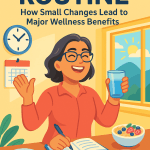This article is for informational purposes only and is not a substitute for professional medical advice.
Understanding Heart Health
Heart health is a vital aspect of overall well-being. With cardiovascular disease being a leading cause of death worldwide, understanding how nutrition impacts heart health is crucial. But what does it mean to eat for a healthy heart? Let’s explore some essential nutrition tips that can help you maintain a strong cardiovascular system.
1. Embrace Whole Foods
Whole foods are minimally processed and rich in nutrients. Incorporating a variety of fruits, vegetables, whole grains, and lean proteins into your diet can significantly improve heart health. For example, a simple meal of grilled salmon with quinoa and steamed broccoli not only provides essential nutrients but also offers omega-3 fatty acids, known for their heart-protective properties.
Why Whole Foods Matter
Whole foods are packed with vitamins, minerals, and antioxidants. These nutrients help combat inflammation and oxidative stress, two factors that contribute to heart disease. Moreover, they tend to be lower in unhealthy fats and sugars compared to processed foods. A study published in PubMed highlights that diets rich in whole foods are associated with lower incidences of heart disease and improved cardiovascular health.
2. Prioritize Healthy Fats
Not all fats are created equal. While saturated and trans fats can raise cholesterol levels and increase heart disease risk, healthy fats can actually protect your heart. Focus on sources of unsaturated fats, such as:
- Avocados
- Olive oil
- Nuts and seeds
- Fatty fish like salmon and mackerel
These fats can help lower bad cholesterol levels and reduce inflammation.
Omega-3 Fatty Acids
Omega-3 fatty acids are particularly beneficial for heart health. According to the American Heart Association, consuming fatty fish at least twice a week can lower the risk of heart disease (AHA, 2022). If you’re not a fan of fish, consider flaxseeds or walnuts as plant-based alternatives. Studies have shown that omega-3s can decrease triglycerides and blood pressure, as well as reduce the risk of arrhythmias. The mechanism behind omega-3s involves their ability to reduce inflammation and improve endothelial function, which is crucial for maintaining healthy blood vessels.
3. Load Up on Fruits and Vegetables
Fruits and vegetables are rich in vitamins, minerals, and fiber, all of which contribute to heart health. Aim for at least five servings a day. Here are some heart-healthy options:
- Berries: High in antioxidants
- Leafy greens: Rich in vitamins and minerals
- Citrus fruits: Good sources of vitamin C and fiber
- Beets: May help lower blood pressure
Incorporating a rainbow of colors into your meals can ensure you get a variety of nutrients. The World Health Organization emphasizes that increased fruit and vegetable intake is linked to a lower risk of heart disease.
Fiber’s Role in Heart Health
Dietary fiber helps lower cholesterol levels and supports healthy digestion. Foods like oats, beans, and whole grains are excellent sources of soluble fiber, which can help reduce the risk of heart disease. A meta-analysis found that higher fiber intake is associated with a lower risk of cardiovascular disease, highlighting the importance of fiber in your diet. Fiber works by binding to cholesterol in the digestive system, preventing its absorption into the bloodstream, thus lowering overall cholesterol levels.
4. Choose Whole Grains
Whole grains are an excellent source of fiber and essential nutrients. Unlike refined grains, whole grains retain their bran and germ, which are rich in nutrients. Incorporate foods like:
- Brown rice
- Quinoa
- Whole wheat bread
- Oats
These options can help improve cholesterol levels and provide sustained energy. The NHS recommends whole grains for their ability to lower the risk of heart disease and support overall health.
Whole Grains vs. Refined Grains
Refined grains, such as white bread and pastries, have been stripped of their nutrients and fiber. Choosing whole grains over refined options can lead to better heart health and weight management. A recent study published in UpToDate found that individuals consuming whole grains had a significantly lower risk of developing coronary heart disease compared to those who primarily consumed refined grains. This is partly due to the higher fiber content in whole grains, which helps regulate blood sugar levels and promotes satiety.
5. Limit Sodium Intake
Excess sodium can lead to high blood pressure, a significant risk factor for heart disease. The American Heart Association recommends limiting sodium intake to less than 2,300 mg per day, ideally aiming for 1,500 mg for most adults. Here are some tips to reduce sodium in your diet:
- Cook at home using fresh ingredients.
- Use herbs and spices for flavor instead of salt.
- Choose low-sodium versions of canned or packaged foods.
By being mindful of sodium, you can help protect your heart. A study in the Journal of Hypertension found that reducing sodium intake can significantly lower blood pressure in individuals with hypertension. It’s essential to read food labels carefully, as many processed foods contain hidden sodium that can quickly add up.
6. Stay Hydrated
Staying well-hydrated is often overlooked but is essential for heart health. Water helps maintain blood volume and regulates body temperature. Aim for at least 8 cups of water a day, and consider increasing your intake if you are physically active or live in a hot climate.
Hydration and Heart Function
Dehydration can lead to increased heart rate and blood pressure, putting extra strain on your heart. Remember to listen to your body and drink water regularly throughout the day. The CDC emphasizes that proper hydration supports overall cardiovascular function and can help prevent complications. You can also hydrate through foods like fruits and vegetables, which have high water content.
Myth vs. Fact
Myth: All fats are bad for heart health.
Fact: Healthy fats, like those found in avocados and fish, are beneficial for heart health.
Myth: You should avoid carbohydrates entirely.
Fact: Whole grains and fruits are essential sources of nutrients and fiber that support heart health.
Myth: You can’t enjoy food and eat healthy.
Fact: A heart-healthy diet can be delicious and satisfying with the right choices.
Patient Vignette
Meet Sarah, a 45-year-old teacher who was recently diagnosed with high cholesterol. After attending a nutrition workshop, she decided to overhaul her diet. By incorporating more fruits, vegetables, and whole grains, and reducing her intake of processed foods, Sarah noticed a significant drop in her cholesterol levels within three months. She feels more energetic and has even started a walking routine. Sarah’s story illustrates how simple dietary changes can lead to profound health benefits. It’s a reminder that small, manageable adjustments can create a ripple effect in one’s health journey.
Frequently Asked Questions
What are the best foods for heart health?
Heart-healthy foods include fatty fish, nuts, seeds, whole grains, fruits, and vegetables. Incorporating these into your diet can help reduce the risk of heart disease.
How much fiber should I eat for heart health?
Adults should aim for at least 25-30 grams of fiber per day. Foods high in fiber include beans, whole grains, fruits, and vegetables.
Can I eat sugar if I want to maintain heart health?
While you don’t need to eliminate sugar entirely, it’s important to limit added sugars in your diet. Focus on natural sugars found in fruits instead.
Is a vegetarian diet good for heart health?
A well-planned vegetarian diet can be very beneficial for heart health, as it typically includes more fruits, vegetables, and whole grains, which are linked to lower heart disease risk.
How does alcohol affect heart health?
Moderate alcohol consumption may have some heart benefits, but excessive drinking can lead to high blood pressure and other health issues. It’s best to consult with a healthcare provider regarding alcohol consumption.
Can I eat out and still maintain a heart-healthy diet?
Yes! Choose restaurants that offer healthy options. Look for grilled instead of fried foods, request dressings on the side, and opt for whole grain options when available.
Practical Tips for Implementing Heart-Healthy Nutrition
Here are some actionable steps to incorporate heart-healthy nutrition into your daily routine:
- Plan Your Meals: Set aside time each week to plan meals that include a variety of heart-healthy foods.
- Grocery Shopping: Make a shopping list focused on whole foods and stick to it to avoid impulse buys.
- Cook at Home: Preparing meals at home allows you to control ingredients and portion sizes.
- Experiment with Recipes: Try new recipes that incorporate fruits, vegetables, and whole grains to keep meals exciting.
- Stay Informed: Educate yourself about nutrition and heart health through reliable sources.
By implementing these tips, you can take charge of your heart health and enjoy the process of nourishing your body.
Key Takeaways
- Incorporate a variety of whole foods for optimal heart health.
- Prioritize healthy fats like omega-3s from fish and plant sources.
- Aim for at least five servings of fruits and vegetables daily.
- Limit sodium intake to reduce blood pressure risks.
- Choose whole grains over refined grains for better nutrition.
- Stay hydrated to support overall heart function.
References
- American Heart Association. (2022). Heart-Healthy Eating.
- World Health Organization. (2021). Cardiovascular diseases (CVDs).
- Centers for Disease Control and Prevention. (2022). Heart Disease Facts.
- NHS. (2023). Healthy eating for a healthy heart.
- PubMed. (2023). The role of dietary fats in heart disease.
- UpToDate. (2023). Nutrition and heart health.
- Journal of Hypertension. (2023). Impact of sodium reduction on blood pressure.








Post a comment